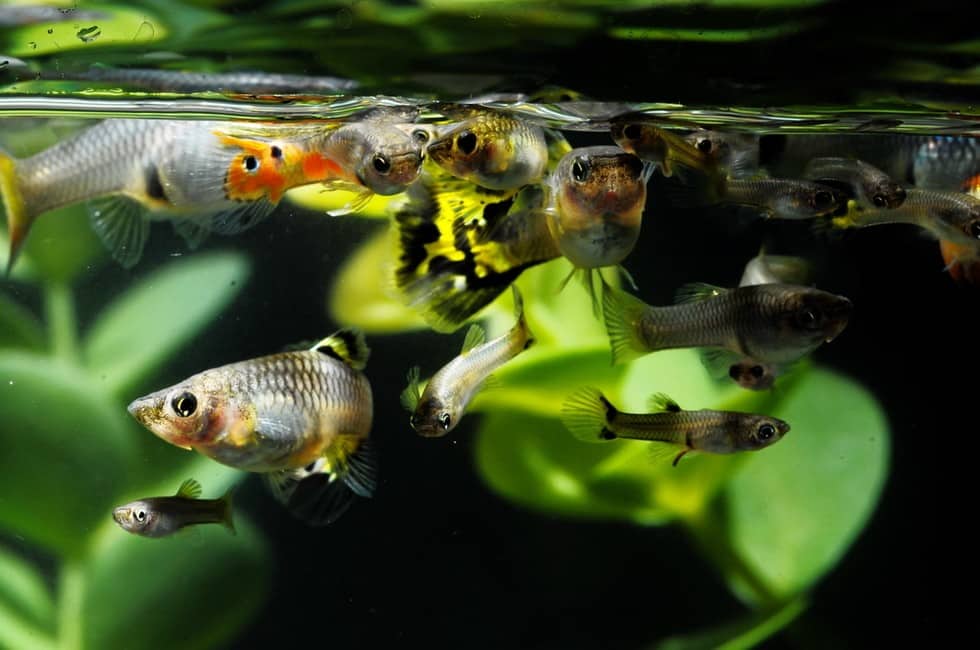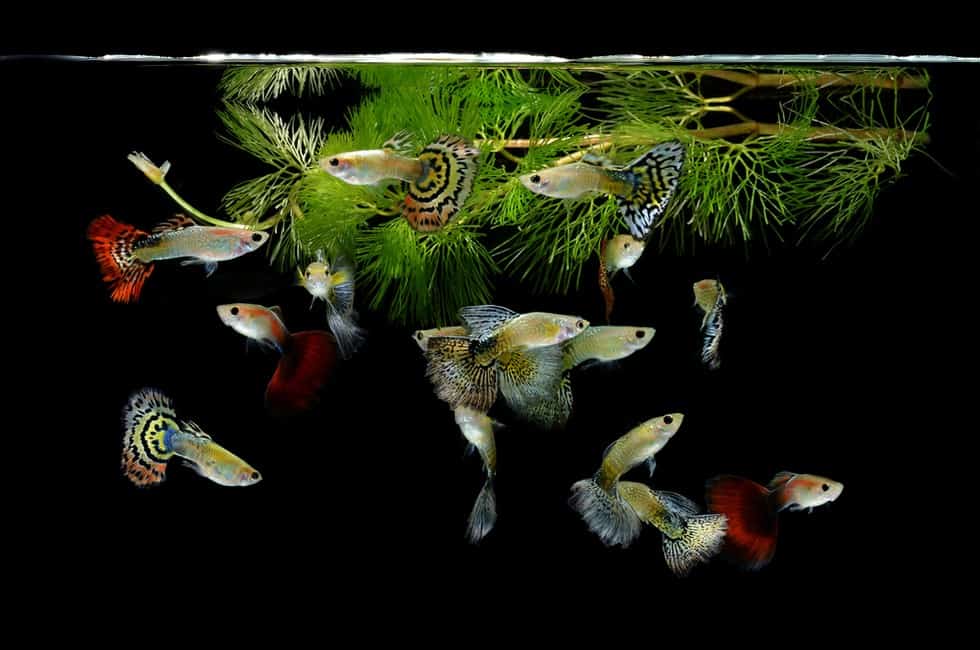In contrast to many cold water fishes, the guppy (poecilia reticulata) which is also referred to as rainbow fish and million fish is a warm water fish. Guppy is widely distributed in tropical region. It is a freshwater fish popularly used for aquarium purposes because they are easy to care for.
Do guppies need a heater? Yes, It is necessary to keep the temperature for guppies between 25.5-27.8 for their survival. So yes! you need a heater except you reside in a tropical climate. During reproduction, guppies prefer cooler temperatures around 22.2-26.1 degrees Celsius.
What is the ideal guppy water temperature? Guppies thrive more in temperature between 25.5 and 27.8°Celsius (78 and 82° Fahrenheit).
Recommended Aquarium Heaters
SZELAM Smart Mini Aquarium Heater
Orlushy Submersible Aquarium Heater
Influence of water temperature on the phenotypic sex ratio of guppies?
An experiment shows that the phenotypic sex of guppies can be altered by the thermal conditions during the early stages of larval development.
During the experiment, it was also discovered that a temperature of 30 degrees Celsius produces the highest number of male population. hence it was concluded that an increase in temperature produces a higher number of male guppies.
Also check: Do Guppies Need a Filter?
What happens when you overheat your guppies?
In a condition whereby your tank is overheated, but your guppies still survive what do I do? it is unsafe to totally change the water in the tank because it subjects them to rapid change in temperature which might even kill your guppies.
Rather, it is advisable to put frozen plastic water in your tank which gradually regulates the temperature of the water till you get your desired temperature.
Effects of water temperature in guppies fertility?
In as many guppies thrive in warm water, elevated temperature tends to reduce their sperm motility, decrease their sperm numbers thereby having a general effect on their male reproductive success.
What is the effect of temperature on guppies immunology?
Guppies immune system is up-regulated by increasing the temperature of the tank and this can be linked to consistent elevation of lysozyme and immunoglobulin M levels in your guppies. Increase in temperature also reduces the survival level of parasites thereby reducing their number.
How do I start a guppy tank?
Select an aquarium of your choice. The inside of the aquarium should be rinsed and dry with a paper towel. cleaning products should be avoided on the inside of your aquarium to prevent contamination by the leftover chemicals.
The guppy tank is placed on an aquarium stand or a sturdy cabinet, make it visible so it wouldn’t be knocked out. The bottom of your tank might be lined with 1 to 2 inches of aquarium substrate or colored gravel if you desire a more natural look.
Make your aquarium three-quarters full with warm water. Install your tank heater, lighting system, and all other aquarium equipment, also insert your in-tank thermometer to monitor temperature changes.
Your tank is safe to add your guppies only when the ammonia and nitrate level reaches zero then it is assumed that your aquarium has been cycled.Then your guppies can be added.
What type of heaters can I use to heat my tank?
Basically, there are four types of heater you can use to heat your tank. They include; hang-on heater, submersible eater, substrate heater and filter heater.
Submersible and immersible heaters are the most suitable heaters for starters because it is relatively cheap and easy to install. Before getting a heater for your tank, it is necessary to understand the pros and cons of such heaters.
Hang-on heaters
Hang-on heaters are are the most common type of heaters because it’s the cheapest and it usually equipped with starter aquarium kits.
When using hang-on heaters ,the heater control must be kept above water line which discourage many people from using it. Hang-on heaters are not advisable for salty aquariums because of electrical shock and corrosion.
Submersible heater
Submersible heaters are either made of glass or durable plastic materials. glass submersible heater are very fragile and they demand gentle handling unlike plastic submersible heaters .in contrast to hang-on heaters, submersible heaters must be be kept below the water line.
There are several ways to position your submersible heater; it can be vertically, horizontally or at any angle. vertical or horizontal positioning is considered the best because it allows the correct reading of water temperature by your thermostat.
To prevent submersible tank floating in your tank, suction cups are used to attach your submersible heater to your aquarium.
Substrate heater
Substrate heater is the most suitable for heating your tank when your tank contains both life plants and guppies because it keeps the substrate warm.
Substrate heaters contains heating coils attached below the substrate which keeps the water warm when activated. Unlike immersible and submersible heaters ,substrate heaters heats your tank more uniformly and they are not visible since it is attached below the substrate.
when the need to service or install your substrate heater arises,your tank must be torn down which discourage many people from using substrate heater.
Filter heater
Benefits of using filter heater include:it makes the aquarium more beautiful because it is invisible,its invisiblity also prevents it from destruction by aggressive guppies. filter heaters are only suitable for larger size aquarium.
What power of heater is advisable for my guppy’s aquarium?
The size of your guppy tank should determine the power of your heater.Small tank requires small wattage to prevent over heating your tank. Take a look below!
| Tank size | Power |
| 5 gallon/25 litres | 50 watt |
| 20 gallons/75 litres | 75 watt |
| 25 gallons/ 100 litres | 100 watt |
| 40 gallons/150 litres | 150 watt |
| 50 gallons/200 litres | 200 watt |
| 65 gallons/250 litres | 250 watt |
| 78 gallons/300 litres | 300 watt |
Do I need a spare aquarium heater?
Spare heaters are use to replace your heaters when it fails.so, yes! it is advisable to have a spare heater. spare heaters are not necessarily an expensive heater they are only needed to heat your tank temporarily pending the time you get another heater.
Can guppies survive in cold water? Guppies are warm water fishes. they can’t survive in cold water so you need a heater for their survival.
Can you put your goldfish and guppies together in the same tank?
Goldfish are cold water fish while guppies are warm water fish so it is not advisable putting both your goldfish and guppies in the same tank.In a condition that demands to put them together, there are factors to consider. these factors include;
Temperature: since goldfish are cold water fish and guppies are warm water fish, it is advisable to find a mid temperature in which both goldfish and guppies can survive. consider 70 degrees Fahrenheit.
Gender: it is not advisable to put both male and female guppies together with goldfish because guppies breed faster than goldfish which may lead to overpopulating the tank thereby making their fry preys to goldfisgh.to prevent this, only a single gender of guppies is advisable to stay together with goldfish
What is the lifespan of my guppies?
In captivity, guppies can live for about 1 to 3 years. there are many factors that determine how long your guppy might live such as;
Temperature: the temperature you subjects your guppies to determines how long your guppy lives. constantly subjecting your guppy to low temperature will reduce their life expectancy.so if you desire your guppy to live long, keep your tank warm
Stress: stress is also a factor that shortens the life expectancy of your guppies. poor lighting conditions, poor feeding, overpopulation and sudden changes in water temperature stress your guppies out.
To prevent this, offer them timely food, prevent sudden changes in tank conditions, don’t put the tank in direct sun rays and avoid overpopulation by limiting their number to one fish per gallon of
Water quality: good water quality increases the life expectancy of your guppies. water should be removed via a filtration system continually to avoid accumulation of toxins in your tank, a third of the water in the tank should be replaced weekly. guppies love hardwater and a little bit saline water.
How to check and maintain my tank?
The most important part of aquarium management is constantly changing the water in your tank.it is recommended to change your water every two weeks.
Only 10-20 percent of the water should be changed.it is necessary to test to test the water parameter of both waters before changing it.
When checking your water, it is necessary to test the level of nitrate, nitrite, ammonia and the PH of your water. your aims when cleaning your fish tank should be; regulating the nitrogen cycle, replenish essential materials and removing dissolved and particulate organic compounds.
Related Questions
How do I keep the nitrates level in my tank low? the process whereby ammonia is converted to nitrite and finally nitrate by bacterias is referred to as nitrogen cycle.
Since ammonia and nitrite are toxic to your guppy, total eradication of bacterias in your tank is toxic to your guppy.nitrates are much less hazardous to your fish and can be reduced regularly by changing your water tank.
How to remove dissolved and particulate organic compounds? Just like ammonia is converted to nitrate by bacterias, dissolved and particulate organic compounds Is also removed by bacterias.
How to replenish minerals in your tank? Insufficient minerals in your tank can result in osmotic imbalance which can later lead to osmotic shock and later death to your guppies .Essential minerals should be added when water is removed from your tank.
Guppies are gorgeous fish which are easy to care of. Hence,it is a good choice for a starter. They don’t need a lot of space so you can get a small aquarium.
Guppies also serve as good pets. you can also breed guppies for a commercial purpose because of their fast rate of spawning.




